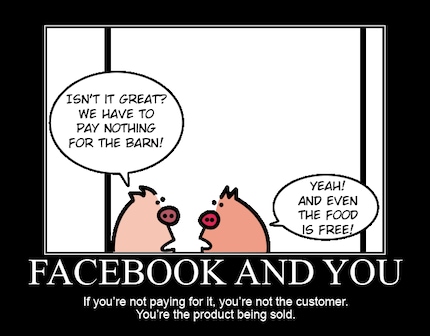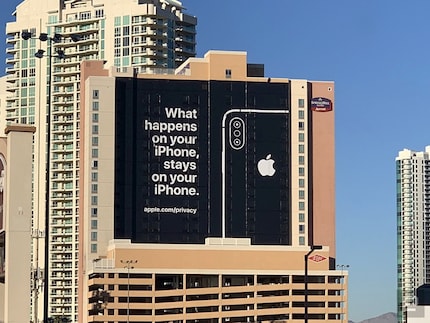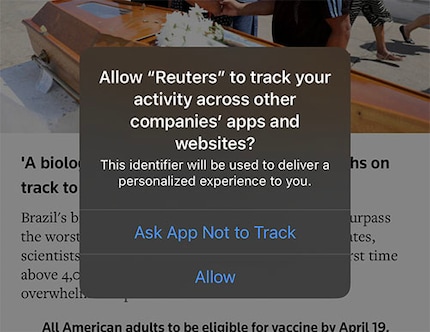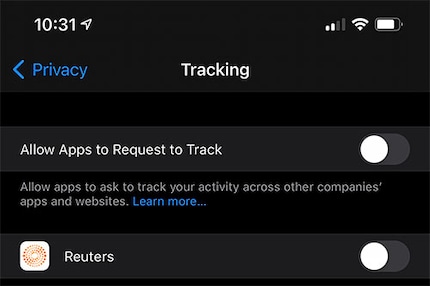
Opinion
Why you should stop using social media right now
by Oliver Herren

Apple’s latest release of the iPhone and iPad operating system puts an end to ad trackers. And comes as good news for the Internet.
On Wednesday 7 April, Apple announced its Internet privacy feature. It was born out of a dispute between social media platform operators and people Apple described as online «data brokers». The spat arose from the fact Apple blocked all third party trackers in version 14 of its Safari browser.
That sounds really abstract but third party trackers, which cookies link to, are essential for one of the main sources of income online. That’s because they allow what are known as targeted ads to be served to users when their interests are known.
Since Apple has put privacy at the top of its agenda, the company is going a step further. From iOS 14.5 onwards, apps have to ask your permission to track you beyond the app.
Ever wondered why Facebook and Instagram serve you adverts for things you’ve looked at on another website? Or how all of a sudden, Instagram shows you a deal for a reduced price iPhone when you’ve just been reading an article about a new iPhone?
How does Instagram know that? And how does the same ad then appear on Facebook? Followed by an ad on the newspaper website where you’re reading?
The simplified answer is: by using a tracker. Essentially, there are things that follow you across the Internet, get to know your interests and transfer this information to anyone who’ll pay for it. In other words, if we at Digitec Galaxus wanted to, we could display an advert of a rose gold iPhone on Instagram to all women in the cantons of Aargau and Wallis. The reason being, we’ve discovered (in this hypothetical situation) that women like rose gold iPhones, and not many iPhones are bought in Aargau and Wallis compared with the number of searches for this type of phone made from these areas. So then, what you end up seeing is a targeted ad tailored to your presumed interests.

For advertisers, that’s obviously interesting. While billboard campaigns are seen by the masses with the hope that the right people will pay attention to them, targeted ads can be used in a much more targeted way. For instance, by showing men in St. Gallen the new PlayStation and women in Aargau an iPhone. That’s how the ad industry tries to ensure their budget doesn’t get squandered and wastage is limited.
An «impression» is each time an ad is displayed and seen by a user. For an ad to gain an impression, you as a user don’t even have to click on it. If you did, it would be considered a «click». If someone ended up buying something because of the advert, this would be called a «conversion». A billboard might get a million impressions each day, but how many of those are actually conversions?
Impressions are just a means to an end, while conversions are the goal. It’s hard to control conversions, but impressions, on the other hand, can be handled with precision. So logically, when an advertiser wants to save money, they’ll buy a million impressions for a certain target audience rather than the world and their dog. Usually, though, online adverts don’t need so many impressions, as ad targeting allows them to be successful with fewer. And that’s cheaper. It also makes the offer more enticing for the end user. It means if you’re an iPhone enthusiast, for instance, you won’t get ads for something you’re not at all interested in, such as the new Ford Kuga including a leasing offer.

But the problematic issues are the trackers. At least, that’s what Apple thinks. Along with pretty much anyone who’s interested in online privacy. Because the way «data brokers» find out that women in Aargau are interested in iPhones is by having a database. And where do they get their data from? Tracking cookies. Each time a woman in Aargau looks at an iPhone online, a cookie will get this information. And I’m not even talking about stuff like Facebook, which sells all of your likes and interests to advertisers.
A data broker will record every scrap of data they can and exploit for marketing purposes.
In short, if you don’t pay for something online, then you’re not the customer. Instead, you're the product that’s being sold.
That’s something Apple doesn’t want to be a part of any more, and so is using Safari 14 and iOS 14.5 to put a spanner in the works of the data machine. The advertising industry and Facebook in particular are not fans. Facebook is concerned about its 86 billion dollar yearly revenue. And its business model.
Apple has been an advocate for privacy for years now. At CES (Consumer Electronics Show) in Las Vegas, there was a poster flaunted on a hotel wall that reminded everyone that the iPhone is the device for privacy.

In fact, privacy is so important to Apple that the company did the honour of taking part in the panel discussion at CES. Facebook also took part.
To be clear, Apple doesn’t want apps and websites to be unable to collect data. But the company is convinced that this data shouldn’t be passed to third parties automatically. Especially not when this data is needed and used to create a profile of your identity.
However, Apple doesn’t want to destroy the ad industry. Apps and websites still have the option to sell your data to data brokers. But only if you give your consent. It has to be explicit and not automatically assumed by you downloading an app or accessing a website.
App tracking shouldn’t be able to happen under the radar any more.
With Apple’s privacy protection measures, permission is in plain sight, meaning you get a notification asking if you want to share your data.

For now, that is.
Because Apple has plans in the works. App Tracking Transparency, as Apple calls it, is just the beginning.
The tracking settings in iOS 14.5 give users a powerful tool, which is incredibly easy to operate. You can essentially do two things: either click on «Ask App not to Track» when asked or select opt-out in the settings.
In a bold move, Apple loaded factory settings on the iPhone and iPad that automatically answer the question for you. This means when an app asks for permission to track you, your iPhone answers without showing you the dialogue box. And it answers with a «no».
In the menu, you’ll also see which apps want to track you and which you’ve already given permission to track you.

When you allow an app to track your data and pass on this information, this will be transfered by using your Identity for Advertisers (IDFA), which is almost like a cookie but linked to your device rather than a browser.
But Apple doesn’t want to hamper or even wipe out the advertising market. That’s something the company’s representatives made sure to highlight was an important issue on a call with a select group of journalists. Rather, Apple wants to let advertisers know they can still access the highly sought-after data, but that it won’t be as easy as it used to be. And above all, there won’t be as much data as there was before.
As soon as an app wants to pass on your IDFA, the app has to ask for your permission. Or not, if you’ve set up the automatic opt-out. Incidentally, the opt-out has a much more far-reaching effect than than just protecting your IDFA (data linked to your device) from ending up in the hands of the ad industry. The phrase «Ask App not to Track» forbids the app from using any other kind of tracking methods. Or at least, it should prevent it. Apple is the first to admit that advertisers are creative and data is valuable. That’s why they’ll need to keep an eye on advertisers and moderate apps carefully.
If advertisers still want to collect data from Apple, they can with Apple's SKAdNetwork. Broadly speaking, this just passes impressions and clicks at app level on to advertisers without including any data related to the person or device these impressions or clicks came from. Apple admits that they recognise this data, but that it’s not important for the company.
Apple is doing the world a big favour with the improvements to the IDFA, SKAdNetwork and settings available to users. It’s not often we as users have so much power and so much information about an otherwise hidden part of the Internet that affects us directly.
However, and of course there’s a however here. As much as I want to believe Apple when the company says it doesn’t just make damn good hardware and software but that the people behind it are also damn nice, I somehow can’t. It’s not like I’m saying «eurgh, Apple’s stupid». On the contrary. It’s more that I think Apple sounds too good to be able to go through with saving privacy settings single-handedly.
Of course, Apple is the most valuable brand in the world and has a lot of market power with its dominant market position. That’s what allows the company to just shut off third party cookies like that and give Facebook the virtual finger. Admittedly, that’s not difficult given Facebook has successfully made itself out to be the bad guy of the Internet in the last few years without putting up much of a fight.
However. Apple is still a company that wants to make a profit. And in fact, a company that’s making a lot of profit right now. And yet, it’s nice when a company is nice. But what happens when the profits don’t look so rosy? What happens to the data that the SKAdNetwork has collected and keeps collecting each day? Rather than looking at x company that’s tapping into our data via third party cookies, we could be faced with a company that owns and can sell all our data through the SKAdNetwork. Where we were once the product for a lot of largely ousted data brokers, we’d now be the product owned by a company.
By this point, Apple probably wouldn’t be alone in this situation. Over at Google, there’s FLoC experimentiert, which is different from the SKAdNetwork at a technological level, but it still comes back to roughly the same thing.
But today, it’s clear that Apple is the hero and the bearer of «good news». And if you think I’m painting a pessimistic picture – well, I can’t help it.
Journalist. Author. Hacker. A storyteller searching for boundaries, secrets and taboos – putting the world to paper. Not because I can but because I can’t not.
Interesting facts about products, behind-the-scenes looks at manufacturers and deep-dives on interesting people.
Show all